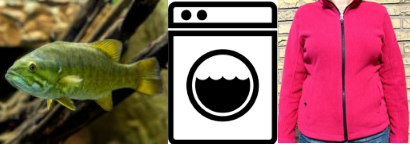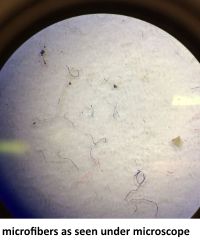Microfiber Pollution

What are microfibers?
Microfibers are synthetic, microscopic fibers that come from synthetic materials, including polyesters and polyamides. Microfibers are used to make mats, knits and weaves for apparel. These tiny fibers are very small and almost invisible. Human activity has led to microfiber pollution in oceans and rivers.Microbeads are different than microfibers. Microbeads are plastic microscopic microspheres used as exfoliating agents in cosmetics and personal care products such as toothpaste, body scrubs, and face wash. Federal and CT legislation has been enacted banning the use of microbeads because they are detrimental to the environment. CT DEEP's Municipal Wastewater division is overseeing the state's activities on microbeads and more information is available on DEEP's

What harm do they pose towards the environment?
Microfibers are found in our oceans coming from many sources including textiles, and we know that the shedding from synthetic clothing is very problematic. In each wash, plastic fibers from synthetic clothing are leaving washing machines and going into rivers and oceans. Sewage plants and waste water treatment plants are unable to effectively remove all of these microfibers. The presence of microfibers in the environment and in seafood is concerning, especially when the potential impacts on wildlife and on human health are in question. Microfibers are one of the most common plastic debris found in invertebrates, fish and marine mammals.
Final Report to the CT General Assembly
The microfiber pollution working group has issued a final report which was submitted to the legislature in January 2020.
NEW for 2020! Report to the Legislature on the Findings of the Synthetic Microfiber Working Group
What is the Microfiber Pollution Working Group?
In February of 2018, the Connecticut House passed HB 5360 (Public Act 18-181) An Act Concerning Revisions to Certain Environmental Quality and Conservation Programs. Section 6 establishes a working group of representatives from both the retail and apparel industry and the environmental community to focus on synthetic microfiber pollution. This working group is meeting in order to develop consumer awareness and education programs in order to present information regarding synthetic microfibers in clothing to the public.
The working group’s first meeting was held on September 18th, 2018:
- Meeting agenda
- Presentations:
- Tom Metzner
- Timnit Kefala, PhD Student, Bren School at University of California Santa Barbara
- Lisa Erdle, PhD Student, University of Toronto
- Meeting notes
Second meeting - November 14, 2018 meeting:
Scientific Studies:
- Microplastics in Seafood and the Implications for Human Health
- Plastic fragments, including microplastics, are now ubiquitous on land, in freshwaters, and in the ocean.
- Plastic microfiber ingestion by deep-sea organisms
- Microfiber Masses Recovered from Conventional Machine Washing of New or Aged Garments
- The great lint migration
Content Last Updated February 2020

